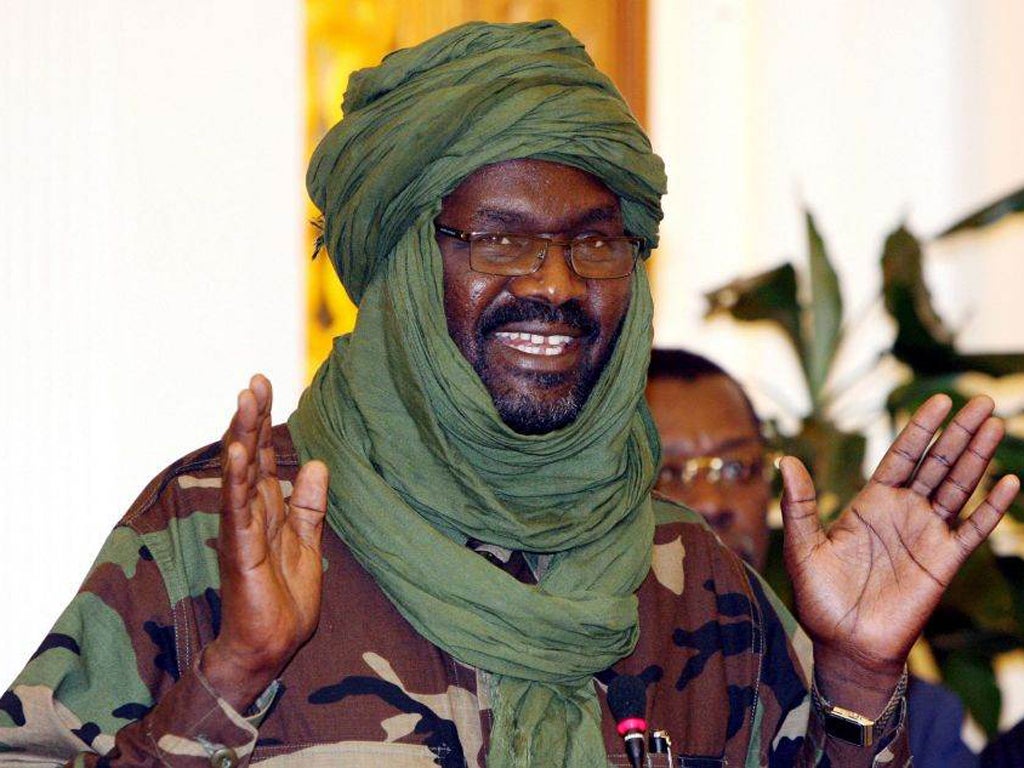Your support helps us to tell the story
From reproductive rights to climate change to Big Tech, The Independent is on the ground when the story is developing. Whether it's investigating the financials of Elon Musk's pro-Trump PAC or producing our latest documentary, 'The A Word', which shines a light on the American women fighting for reproductive rights, we know how important it is to parse out the facts from the messaging.
At such a critical moment in US history, we need reporters on the ground. Your donation allows us to keep sending journalists to speak to both sides of the story.
The Independent is trusted by Americans across the entire political spectrum. And unlike many other quality news outlets, we choose not to lock Americans out of our reporting and analysis with paywalls. We believe quality journalism should be available to everyone, paid for by those who can afford it.
Your support makes all the difference.Khalil Ibrahim, who died on 24 December, was the leader of the main Darfur rebel group in Sudan.
He had been injured two days before in fighting west of the Sudanese capital, Khartoum, and the Sudanese army said his death was a key victory over the rebels, who had rejected a peace deal with the government.
The army said Ibrahim and several of his comrades died during an offensive in the North Kordofan state undertaken in retaliation for a rebel attack there, which authorities said had killed civilians. Ibrahim led the Darfur-based Justice and Equality Movement, or JEM, which unlike other Darfur rebel groups did not join last year's peace deal signed with the government.
Darfur has been in turmoil since 2003, when ethnic African rebels accusing the Arab-dominated Sudanese government of discrimination took up arms against it. The conflict and the related humanitarian crisis has killed an estimated 300,000 people and displaced 2.7m. The fighting has tapered off since 2009, but the conflict continues to simmer and local grievances over government neglect remain.
Fighting in the area had recently flared up, and the Sudanese army said the rebels from Darfur attacked three locations in neighbouring North Kordufan. Ibrahim and his associates were attacked when they were retreating, apparently towards South Sudan, which seceded from Sudan in July to became the world's newest country. Ibrahim was believed to have been living in exile in Libya, where he enjoyed the support of Muammar Gaddafi until his death in October. After that, he reportedly returned to Sudan.
Ibrahim, a physician, was from the Koba branch of the Zaghawa ethnic group, located mainly in Sudan. He was a supporter of the National Islamic Front's seizure of power under the direction of the Islamist Hassan al-Turabi in 1989, and served as the state minister for education in Darfur between 1991 and 1994.
By Ibrahim's own account, he became disaffected with the Islamist movement by 2000 because of the National Islamic Front's economic policies, as well as its support to armed militias. At this time, he became part of a covert cell of Islamists who were seeking to change the NIF from inside.
He went on to serve as the state minister for social affairs in Blue Nile in 1997 before taking up the post of advisor to the governor of Southern Sudan in 1998. However, he never received a national-level appointment – as his JEM colleague Ahmad Tugod said: "Khalil is not a first or even second class political leader ... He struggled all of his life to get a post in Khartoum."
Ibrahim resigned his governorship of South Sudan in August 1998, several months before the scheduled end of his appointment, and formed a Non-Govermental Organisation called "Fighting Poverty". He then went to the Netherlands to studying for a Masters in Public Health at the University of Maastricht.
In August 2001, Ibrahim announced the formation of the Justice and Equality Movement, which received political and financial support from Libya. In June 2006, he co-founded the National Redemption Front rebel group.
Dr Khalil Ibrahim, physician and rebel: born Sudan 1957; died North Kordofan, Sudan 24 December 2011.

Join our commenting forum
Join thought-provoking conversations, follow other Independent readers and see their replies
Comments